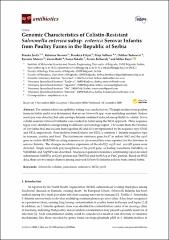Genomic Characteristics of Colistin-Resistant Salmonella enterica subsp. enterica Serovar Infantis from Poultry Farms in the Republic of Serbia

View/
Date
2020Author
Jovčić, Branko
Novović, Katarina
Filipić, Brankica
Velhner, Maja
Todorović, Dalibor
Matović, Kazimir
Rašić, Zoran
Nikolić, Sonja
Kiškarolj, Ferenc
Kojić, Milan
Metadata
Show full item recordAbstract
The antimicrobial susceptibility testing was conducted on 174 single isolates from poultry
farms in Serbia and it was determined that seven Salmonella spp. were multidrug resistant. Sixteen
serotypes were detected, but only serotype Infantis confirmed reduced susceptibility to colistin. Seven
colistin resistant Salmonella Infantis were studied in detail using the WGS approach. Three sequence
types were identified corresponding to di erent epizootiology region. The isolate from the Province
of Vojvodina 3842 and isolates from Jagodina (92 and 821) are represented by the sequence type ST413
and ST11, respectively. Four isolates from Kraljevo are ST32, a common S. Infantis sequence type
in humans, poultry and food. The fosfomycin resistance gene fosA7 in isolate 3842 and the vgaA
gene in isolate 8418/2948 encoding resistance to pleuromutilins were reported for the first time in
serovar Infantis. The changes in relative expression of the phoP/Q, mgrB and pmrA/B genes were
detected. Single nucleotide polymorphisms of the pmrB gene, including transitions Val164Gly or
Val164Met, and Arg92Pro are described. Analyses of quinolone resistance determining region revealed
substitutions Ser83Tyr in GyrA protein and Thr57Ser and Ser80Arg in ParC protein. Based on WGS
data, there are two major clusters among analyzed Salmonella Infantis isolates from central Serbia.
